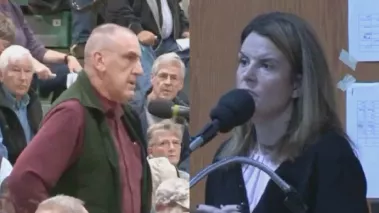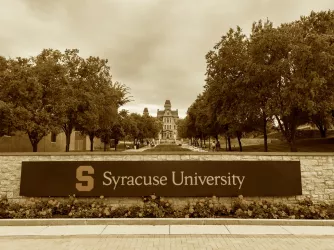Table of Contents
Massachusetts town stifles ‘disparaging’ comments at town hall meeting concerning phony overtime billing

https://townhallstreams.com/stream.php?location_id=80&id=55679
At Sterling, Massachusetts' Special Town Meeting, resident James Gettens (left) exchanges words with moderator Jessica Scalise-Mullett (right).
UPDATED (May 8, 2024): VICTORY! After FIRE wrote to Sterling about the unconstitutionality of banning “disparaging” comments in town hall meetings, the moderator at the latest Annual Town Meeting refrained from banning any language and only requested that comments be on-topic and nonrepetitive. Additionally, Sterling responded to FIRE's public records request in the negative, indicating that no “disparagement” ban was ever formally adopted as a policy. Now residents of Sterling are free to exercise their First Amendment rights and engage in candid public discussion. FIRE commends the Sterling Select Board for abandoning its “disparagement” ban.
At town meetings in Sterling, Massachusetts, questioning whether public employees have a conflict of interest or are billing taxpayers for private, commercial endeavors under the guise of overtime is enough to lose your microphone privileges. That’s exactly what happened to resident and retired attorney James Gettens last year during a public comment period for a motion to audit the Sterling Board of Health.
Gettens knew his free speech rights under the First Amendment and the Massachusetts Declaration of Rights. But that didn’t stop moderator Jessica Scalise-Mullett from accusing him of “disparaging” a Board of Health employee and telling him “not to go there” before cutting his comment short. The exchange can be viewed here at the 1:50:00 mark.
The Sterling Select Board holds town hall meetings where residents can comment on motions prior to voting. At the beginning of a meeting last October, moderator Scalise-Mullett announced, “I’m asking we don’t make disparaging comments either to anyone who’s either made a motion, anyone that’s connected to a motion, anyone that might not be connected to the motion, anyone that’s related to the dog of the person who made a motion or anything to that effect.”
In other words, the Select Board bans any “disparaging” comments, in any context. That’s a pretty wide net, especially considering that what qualifies as “disparaging” is undefined, constitutes a matter of opinion, and falls to the complete discretion of the moderator. While it remains unclear if this ban is an official town policy or an informal policy enforced by the moderator, either way it is unconstitutional viewpoint discrimination.
This week, FIRE submitted a public records request to ascertain whether the town has a formal policy banning “disparaging” comments. We also sent a letter to the Sterling Select Board asking that it lift the ban, if it does in fact maintain one, as it violates the First Amendment and the Massachusetts Declaration of Rights.
The First Amendment protects the free speech rights of individuals to make “disparaging” comments in settings like Sterling’s town hall meetings which are, at minimum, limited public forums. The United States Supreme Court has held that in limited public forums, towns can restrict speech only in a reasonable and viewpoint-neutral manner. For instance, Sterling can decide when the public may speak, and may require comments to stay on topic — but it cannot cut off residents simply for complaining about local corruption, even if town officials subjectively consider that criticism rude, harsh, or “disparaging.”
Such authority would give government officials far too much discretion to decide what speech is acceptable, and they would inevitably weaponize it to silence legitimate criticism, as at a Special Town Meeting last year. This is the fox guarding the henhouse. A town hall meeting is precisely the forum for the public to voice opinions on local government matters — opinions which may include pointed criticism of town officials or employees. Silencing such criticism while freely allowing praise of government officials unconstitutionally discriminates against disfavored viewpoints.
Just last year, the Massachusetts Supreme Judicial Court struck down a similar ban that required all public comments to be “respectful and courteous, and free of rude, personal, or slanderous remarks.” The court recognized the difference between harsh or critical speech and disruptive conduct. Certainly, towns may remove individuals who are disruptive by, for example, speaking out of turn. But Gettens calmly used his allotted time to try to inform other Sterling residents about a public employee’s perceived conflict of interest and about the fruits of a public records request Gettens filed for that employee’s timesheets. In no way did Gettens disrupt the meeting or conduct himself in a manner that warranted the moderator cutting him off.
Town hall meetings are supposed to encourage civic engagement and inform the public. Yet, FIRE has repeatedly confronted local government officials who censor public comments. Fortunately, we’ve recently secured a couple victories on that front. We aim to add Sterling, Massachusetts, to the list.
FIRE defends the individual rights of all Americans to free speech and free thought — no matter their views. FIRE’s proven approach to advocacy has vindicated the rights of thousands of Americans through targeted media campaigns, correspondence with officials, open records requests, litigation, and other advocacy tactics. If you think your rights have been violated, submit your case to FIRE today.
Recent Articles
FIRE’s award-winning Newsdesk covers the free speech news you need to stay informed.

From the UK to Germany to Singapore: Police are watching what you post

Wisconsin school district mulls unconstitutional ‘hate speech’ policy

A cartoon, a mustache, and a witch hunt: The perils of bias reporting at Syracuse University


